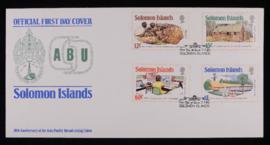Identity area
Reference code
AU PMB DOC 544
Title
Date(s)
- 1982-1984 (Creation)
Level of description
Collection
Extent and medium
1 digital PDF copy of original 12 page A5 booklet
1 digital PDF copy of 1 set of first day covers stamps
Context area
Name of creator
Biographical history
Dr Martin Hadlow has extensive experience in communications and broadcasting for community development, having worked in Asia, the Pacific and the Middle East. Early in his career he worked in radio in Papua New Guinea and in the 1980s was Head of Development and Training at the Solomon Islands Broadcasting Corporation as it transitioned from a government station to a revamped, independent public broadcaster. Dr Hadlow has provided extensive training internationally and has served in a number of high profile roles, including with the United Nations Educational, Scientific & Cultural Organisation (UNESCO).
Dr Hadlow earned his PhD in 2016 from the University of Queensland (UQ) with the thesis titled: WIRELESS AND EMPIRE AMBITION - Wireless telegraphy/telephony and radio broadcasting in the British Solomon Islands Protectorate, South-West Pacific (1914 - 1947): political social and developmental perspectives on radio broadcasting in the British Solomon Islands Protectorate. Dr Hadlow also served as Director of the Centre for Communication and Social Change at UQ. He is also involved with industry and community groups such as the Solomon Scouts and Coastwatchers Trust and the Asia-Pacific Broadcasting Union (ABU).
Repository
Archival history
Immediate source of acquisition or transfer
Content and structure area
Scope and content
The first music and voice transmitted by radio in the British Solomon Islands Protectorate (BSIP) occurred in 1923 through the Methodist Mission?s wireless station at Kokegolo in New Georgia. The station often presented choral and band recitals performed in local languages, primarily for the interest of passengers on passing ships which were equipped with wireless sets. However, actual broadcasting in the BSIP began in June, 1944 with radio station WVUQ based in Guadalcanal, and was followed a few months later by WVTJ based in Munda. Both stations were operated by the United States of America military as part of the Armed Forces Radio Service (AFRS) and were primarily sources of news and entertainment for American troops serving in the Pacific. Both stations were part of a grouping known as ?The Mosquito Network?.
In the years after World War II, a radio service was maintained by volunteers in Honiara, primarily for an English-speaking, licence fee-paying, expatriate audience. In 1952, the Solomon Islands Broadcasting Service was established as VQO, broadcasting news and music six days a week to local audiences in most parts of the British Solomon Islands Protectorate. By the mid-1950s, colonial administrators saw the important role radio was playing for local audiences and invested in programming (including Pijin content), staff, transmitters and new studios. The studios on Mendana Avenue, Honiara, opened in 1959. By the 1960s, SIBS was also providing school services and outside broadcasting of special events, putting a strain on the still new studio facilities. Studio and office upgrades were made in 1965.
In 1976, under the administration of Sir Peter Kenilorea, SIBS became a statutory body, and commenced operations as the Solomon Islands Broadcasting Corporation (SIBC) in 1977. In 1978 the Australian Government committed funds for the upgrade of studio and transmission facilities in Honiara, the establishment of a new regional station in Gizo and correspondents based in more remote parts of the country. Broadcasting House at Rove, Honiara opened on 7 August, 1982.
From 1980-1984, Martin Hadlow was the News/Programme Trainer, then Head of Development and Training at SIBC. During this time the service transitioned from a government broadcasting service to an independent public service broadcasting corporation. This transition meant new management (including a new Board), a complete revamp of programming and news structure, and the new studio building at Rove. Hadlow prepared this booklet for the opening of the studio and was involved with the preparation of the First Day Cover stamp set for the 20th Anniversary of the Asia-Pacific Broadcasting Union (ABU).
Appraisal, destruction and scheduling
Accruals
System of arrangement
Conditions of access and use area
Conditions governing access
Available for reference
Conditions governing reproduction
Language of material
Script of material
Language and script notes
Physical characteristics and technical requirements
See individual items.
Finding aids
Allied materials area
Existence and location of originals
Pacific Manuscripts Bureau
Existence and location of copies
Access this title at PMB Member Libraries or by contacting the Bureau directly: http://asiapacific.anu.edu.au/pambu/accessing.php
Related units of description
Notes area
Alternative identifier(s)
Access points
Subject access points
Place access points
Name access points
- Hadlow, Martin (Subject)
Genre access points
Description control area
Description identifier
Institution identifier
Rules and/or conventions used
Dates of creation revision deletion
Language(s)
Script(s)
Sources
Digital object metadata
Filename
Digital_reference_image.pdf
Latitude
Longitude
Media type
Text
Mime-type
application/pdf


